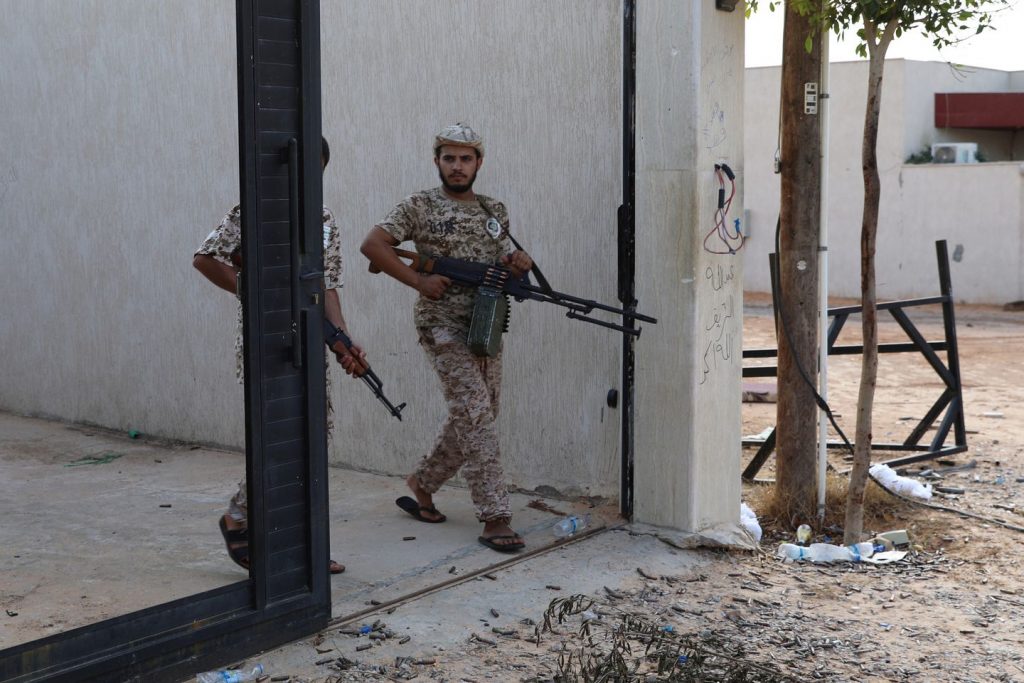
Speaking in an interview during a visit to Washington, Bashagha said the men had provided “confessions” and remained in detention while the GNA attorney general investigates their activities.
The alleged intelligence operation coincides with mounting concern about Russian involvement in a battle for control of Tripoli and the larger schism in the country that has impaired the oil industry and provided a foothold to Islamist militant groups.
Moscow’s role appears to be drawing the attention of the Trump administration, which has not made Libya a foreign policy priority despite crippling instability eight years after the toppling of dictator Moammar Gaddafi.
U.S. and Libyan officials say that hundreds of Russian mercenaries are now fightingalongside forces reporting to renegade Libyan commander Khalifa Hifter, potentially providing the GNA’s eastern-based rival the ability to shatter a prolonged stalemate in his offensive for the Libyan capital.
A Western official, who spoke on the condition of anonymity to discuss diplomatic issues, said the Russian government was putting “a lot of pressure” on the GNA’s leadership to free the two men, who the officials said were “part of a broader effort” by Moscow to assert influence in Libya.
“It’s safe to say that what Russia is doing now in Libya is part of the hybrid warfare approach that they’ve taken in Ukraine and elsewhere, to employ a variety of means, many of them deniable, to try to advance their interests. A lot of this is run out of Prigozhin’s shop there and the Wagner Group,” the official said, referring to Yevgeniy Prigozhin, the Kremlin-linked businessman who U.S. officials say runs Wagner and was charged with criminal interference in the 2016 elections.
The Kremlin has denied knowledge of Russian mercenaries in Libya while a spokesman for Prigozhin denied the businessman has any links to the Wagner Group.
Bloomberg previously reported the detained Russians had met twice in the months before their arrest with Saif Gaddafi, the former dictator’s son who is wanted by the International Criminal Court but is believed to be seeking a political comeback.
Bashagha cited the contacts with Gaddafi and said that Russia’s goal had long been “to bring the former regime back to power.”
In a briefing to the United Nations Security Council on Monday, Libya envoy Ghassan Salame said the “growing involvement of mercenaries and fighters from foreign private military companies” had intensified fighting in Libya.
An upcoming report from a U.N. panel of experts is expected to document alleged violations of an international arms embargo by multiple countries, including the United Arab Emirates and Jordan in support of Hifter’s forces and Turkey in support of the GNA.
Bashagha acknowledged that the GNA had acquired weaponry from Turkey or Turkish companies in the months after Hifter launched his offensive. “We have a right to defend our families,” he said.
The minister spoke after holding talks, along with GNA Foreign Minister Mohamed Taha Siala, with officials from the White House, State Department and Pentagon in which the GNA requested greater U.S. involvement in Libya. “We believe that America is the only one capable of helping Libyans get out of this crisis,” he said.
Their visit occurs amid divisions in the Trump administration over the direction of U.S. policy on Libya. Current and former officials say that officials at the White House have articulated greater openness to Hifter in recent months, while the State Department has remained more closely aligned to the GNA.
President Trump appeared to upend years of consistent support for the GNA in April when he and Hifter discussed their “shared vision” for Libya in a phone call shortly after the commander launched his offensive on the Libyan capital.
A State Department statement issued after last week’s meetings called on forces loyal to Hifter to end their offensive on Tripoli.
Raghavan reported from Cairo.
